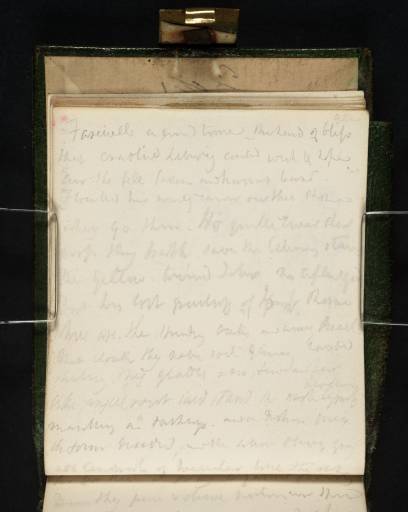Joseph Mallord William Turner Inscription by Turner: Poem on the Eve of Departure from Rome 1828-9
Joseph Mallord William Turner,
Inscription by Turner: Poem on the Eve of Departure from Rome
1828-9
Folio 8 Verso:
Inscription by Turner: Poem on the Eve of Departure from Rome 1828–9
D21866
Turner Bequest CCXXXVII 8a
Turner Bequest CCXXXVII 8a
Pencil on white wove paper, 88 x 71 mm
Inscribed in pencil by Turner with fifteen lines of verse (see main catalogue entry)
Inscribed in pencil by Turner with fifteen lines of verse (see main catalogue entry)
Accepted by the nation as part of the Turner Bequest 1856
References
1909
A.J. Finberg, A Complete Inventory of the Drawings of the Turner Bequest, London 1909, vol.II, p.725, CCXXXVII 8a, with transcription of first seven lines.
1910
C[harles] Lewis Hind, Turner’s Golden Visions, London and Edinburgh 1910 and 1925, p.147.
1966
Jack Lindsay, J.M.W. Turner: His Life and Work: A Critical Biography, London 1966, pp.167, 244 note 37.
1968
John Gage, ‘Turner’s Academic Friendships: C.L. Eastlake’, Burlington Magazine, vol.110, December 1968, p.682.
1969
John Gage, Colour in Turner: Poetry and Truth, London 1969, p.165.
1982
Evelyn Joll and Martin Butlin, L’opera completa di Turner 1793–1829, Classici dell’arte, Milan 1982, p.8.
1984
Cecilia Powell, ‘Turner on Classic Ground: His Visits to Central and Southern Italy and Related Paintings and Drawings’, unpublished Ph.D thesis, Courtauld Institute of Art, University of London 1984, pp.343 note 181, 439.
1987
Cecilia Powell, Turner in the South: Rome, Naples, Florence, New Haven and London 1987, pp.165, 207 note 136.
1990
Kathleen Nicholson, Turner’s Classical Landscapes: Myth and Meaning, Princeton 1990, pp.252, 262 note 56.
1997
Anthony Bailey, Standing in the Sun: A Life of J.M.W. Turner, London 1997, pp.256, 438 note 43.
2008
James Hamilton, Nicola Moorby, Christopher Baker and others, Turner e l’Italia, exhibition catalogue, Palazzo dei Diamanti, Ferrara 2008, p.68.
2009
James Hamilton, Nicola Moorby, Christopher Baker and others, Turner & Italy, exhibition catalogue, National Galleries of Scotland, Edinburgh 2009, pp.76, 153 note 33.
The dense inscription on this page is a poem by Turner, written with the sketchbook turned vertically. It continues onto folio 9 recto opposite (D21867). Since Finberg’s initial transcription of part of the poem in his 1909 Inventory of the Turner Bequest, the text has been cited by numerous Turner scholars, among them John Gage and Cecilia Powell, both of whom concluded that Turner likely produced the poem on the eve of his departure from Rome.1 He left the city early on Saturday 3 January 1829, according to an inscription inside the front cover of the Rome, Turin and Milan sketchbook of the same tour; see Tate D41050 (Turner Bequest CCXXXV).
While parts of the poem are illegible, much of it was transcribed by Finberg, and later amended by Gage:
Farewell a second time the Land of all bliss
that cradled Liberty could wish & hope,
E’er the fell Saxon and Norman band
Flouted his [?early] terror on thy shore.
Why go then? No gentle [?traveller
Crosses thy path save the [?ailing] st[...]
The yellow [?winding] Tiber [?so refulgent]
But his lost greatness of Imperial Rome.
Where are the sturdy oaks and Beech
That cloath thy native soil? [...]
that cradled Liberty could wish & hope,
E’er the fell Saxon and Norman band
Flouted his [?early] terror on thy shore.
Why go then? No gentle [?traveller
Crosses thy path save the [?ailing] st[...]
The yellow [?winding] Tiber [?so refulgent]
But his lost greatness of Imperial Rome.
Where are the sturdy oaks and Beech
That cloath thy native soil? [...]
There are five more lines, albeit increasingly difficult to make out. The verse continues on D21867
opposite, picking up after four more obscure lines:
opposite, picking up after four more obscure lines:
[...] and should be duly paid
A Debt which to quit has become a duty
Not to be shewn by words but works
As that [...] of long [...]
Ariel Claude whose [?study ...] all
Thy beauty Italy and give to the[e]
what Briton [?boasts] of thy trees & parks
A Debt which to quit has become a duty
Not to be shewn by words but works
As that [...] of long [...]
Ariel Claude whose [?study ...] all
Thy beauty Italy and give to the[e]
what Briton [?boasts] of thy trees & parks
Powell noted that Turner’s foray into poetry was evidently an attempt to match the last poem in Samuel Rogers’s Italy; ‘A Farewell’.2 This was one of the poems for which Turner had recently provided a vignette: see Meredith Gamer’s entry in the present catalogue (Tate D27667; Turner Bequest CCLXXX 150). Turner may also have drawn inspiration from the ‘Farewell to Italy’ in William Sotheby’s Italy and Other Poems of 1828.3 While parts of Turner’s poem are illegible or obscure in meaning, several of its phrases indicate that ‘despite all the new experiences of 1828, his basic attitude towards Italy, her history and her countryside, had changed remarkably little’, Powell concluded.4
Hannah Kaspar
December 2024
How to cite
Hannah Kaspar, ‘Inscription by Turner: Poem on the Eve of Departure from Rome 1828–9’, catalogue entry, December 2024, in David Blayney Brown (ed.), J.M.W. Turner: Sketchbooks, Drawings and Watercolours, Tate Research Publication, February 2025, https://www

